Welcome to another issue of The Newport Cornucopia where we dig through the newspapers archives for interesting news articles and adverts. All articles are posted verbatim and most headlines are original (headlines in quotes are my own).

The Red and Blue House Pubs
In the late 1860s, the Mendalgief area of Newport gained a reputation for two notorious drinking houses — the Red House and the Blue House. Both were repeatedly hauled before the courts for opening illegally on Sundays, with police forced to go undercover to gather evidence as the pubs were too well-guarded for uniformed officers to enter.
Inside, dozens of men could be found drinking openly, turning the neighbourhood into a Sunday scene of rowdy drunkenness. Fines were issued, licenses suspended, and by 1869 the Blue House had its license revoked altogether, while the Red House’s days were likely numbered.
John Roderick, of the Red House beerhouse, Mendelgief, was charged with selling beer at illegal hours. Between eleven and twelve on Sunday morning P. S. McEvoy visited defendant's house. He was in plain clothes, as the house was too well watched to enable officers in uniform to detect the defendant, of whom complaints had been made that the house was open all day. He found on the premises nine men, who were drinking. It appeared the house had been licensed since the commencement of the Alexandra Dock works. Inspector Shepard said the officers had frequently seen men leaving the house, but in consequence of the "look out," the offence against the law could not be proved. Fined 40s. and costs.
"He found on the premises twenty-four men, most of whom were drinking in one room, and others standing at the back door with a jug of porter."
Daniel Davies, of the Blue House beerhouse, Mendelgief, was charged with a similar offence. P.C. McEvoy proved this case. He found on the premises twenty-four men, most of whom were drinking in one room, and others standing at the back door with a jug of porter. Inspector Sheppard gave the "Blue" House the same character as he had given the "Red" House. Fined 40s. and costs.
— Monmouthshire Merlin, 22nd August, 1868
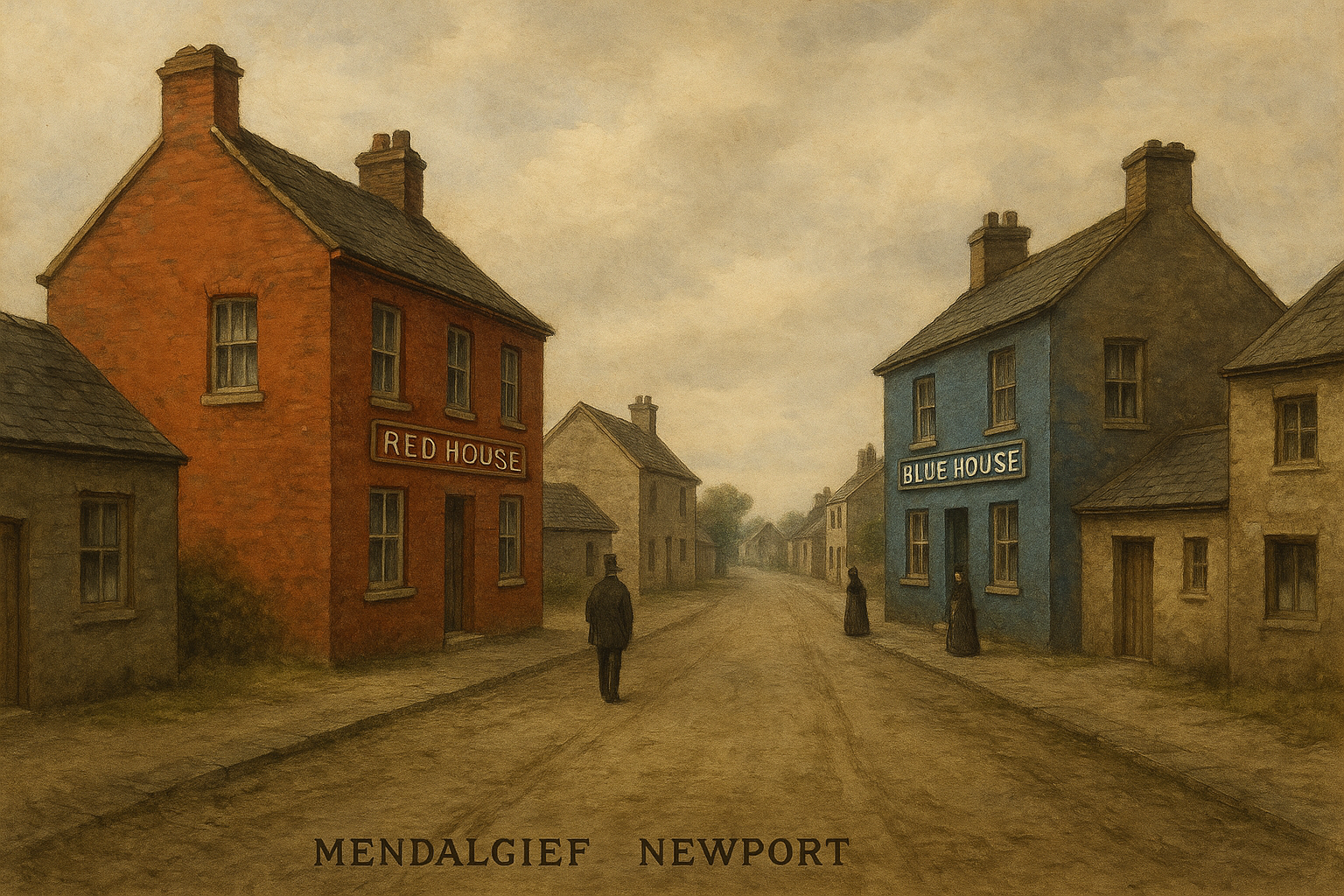
The Blue House, under a different owner, was in trouble again in 1869 when 32 people were caught drinking out of hours.
Edward Watkins, of the Blue-house Inn, St. Woollos, was again charged with an infringement of his license, by allowing drinking to be carried on at illegal hours on his premises. P.C. Agg proved the offence. He saw a number of men in the yard— about 32, drinking. John Thomas was in company with the last witness, on Sunday last, and corroborated his evidence.
Inspector Sheppard said there was a previous conviction recorded against the defendant on the 15th of August last [See above]. It was not safe for a policeman alone to visit the house. The neighbourhood was a regular scene of drunkenness on a Sunday. Defendant was again fined £ 2, and 14s. 6d. costs.
— Monmouthshire Merlin, 18th September, 1869
Just a week later, the Blue House pub had it's beerhouse license removed and if the Red House was still as bad I'm sure it didn't last much longer either.
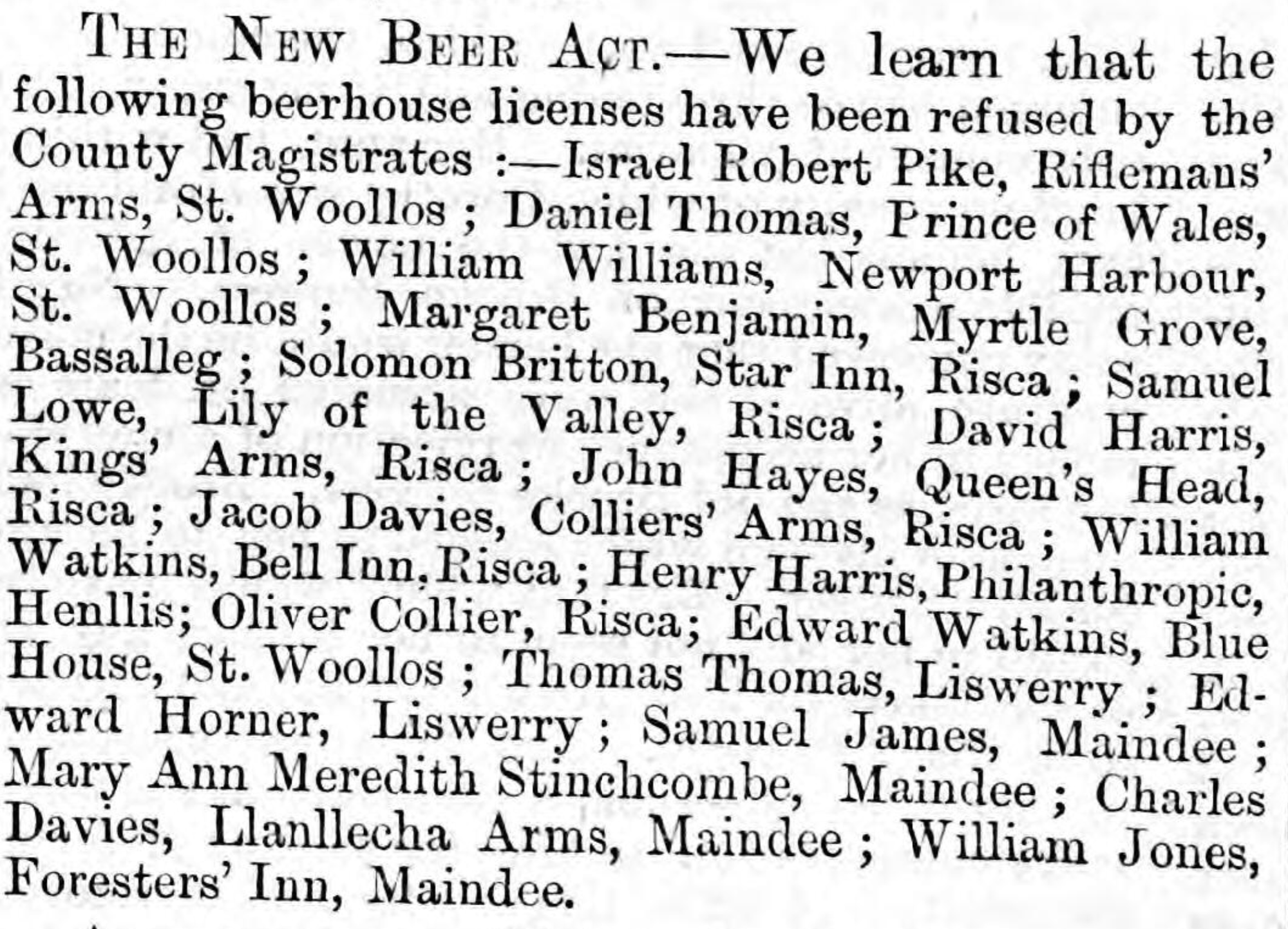

'Don Juan and the Field of Forty Footsteps'
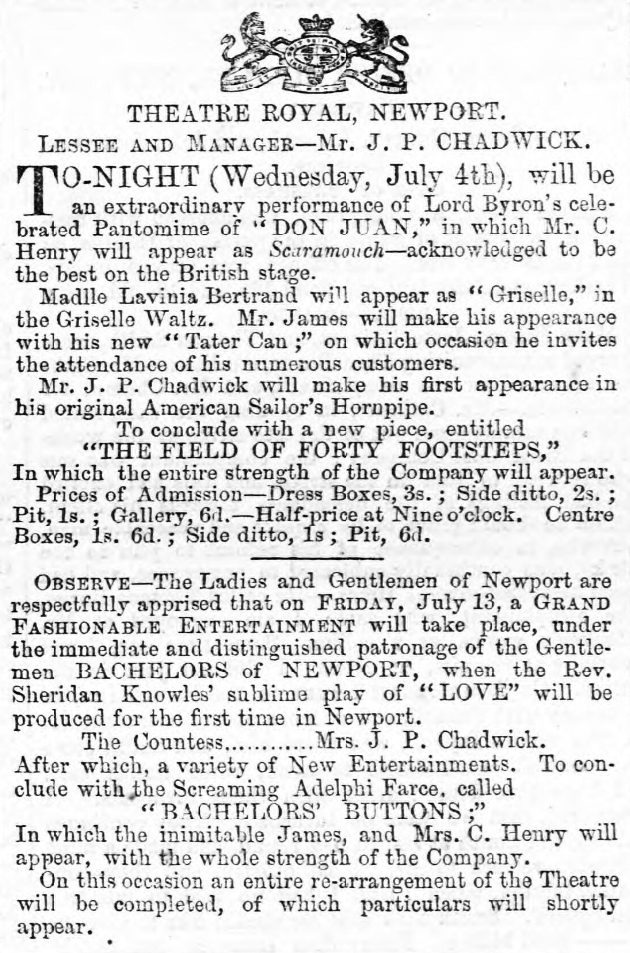

'A Fine Fat Ox'
To the Editor of the Monmouthshire Merlin
Sir,—Not long since I noticed in your extensively circulated paper, a paragraph, in which you expressed a desire to be informed of any person who contributes to the comforts of the poor of this neighbourhood, in order that you may give publicity to the same, with a view to stimulate others who have it in their power to follow so good an example.
I am glad to have an opportunity of speaking of the liberality of Mr. Powell, the Gaer, in having a fine fat ox killed, and distributing it amongst his workmen and the poor of his neighbourhood —an act which I consider you will deem worthy of notice.
I am, &c.,
A PHILANTHROPIST.
Newport, Dec. 23rd, 1846
— Monmouthshire Merlin, 26th December, 1846

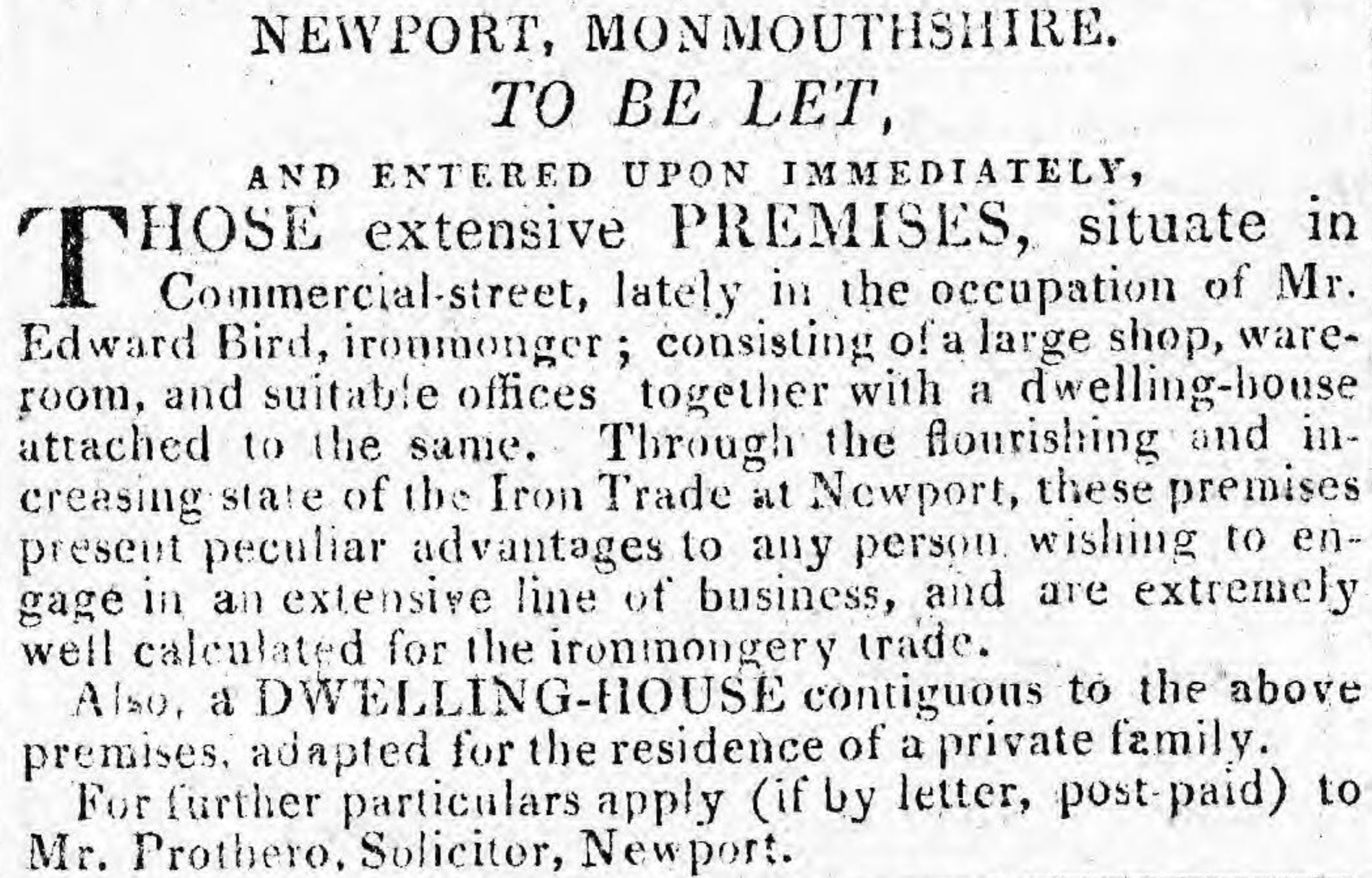

'The Origins of the Refuse Tip?'
At the quarterly meeting of Newport Council in May 1886, there was a mention of a field near Mendalgief Road that could be leased by scavengers for depositing rubbish — could this be the origin of the refuse tip?

The current tip was licensed in 1977 according to the Argus but earlier maps show no signs of a tip (the map below is around the turn of the 19th/20th century) so perhaps it was just too far away.
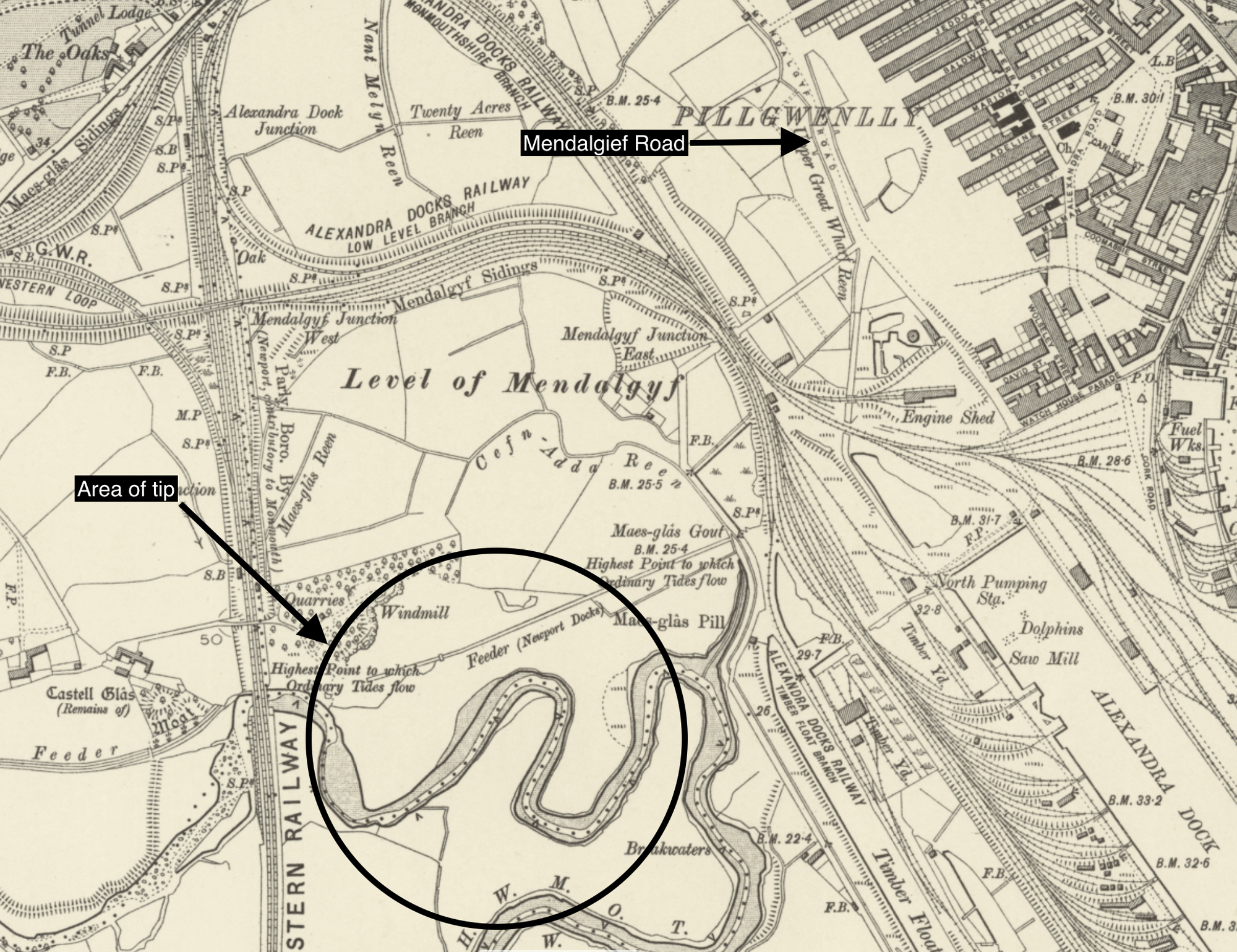

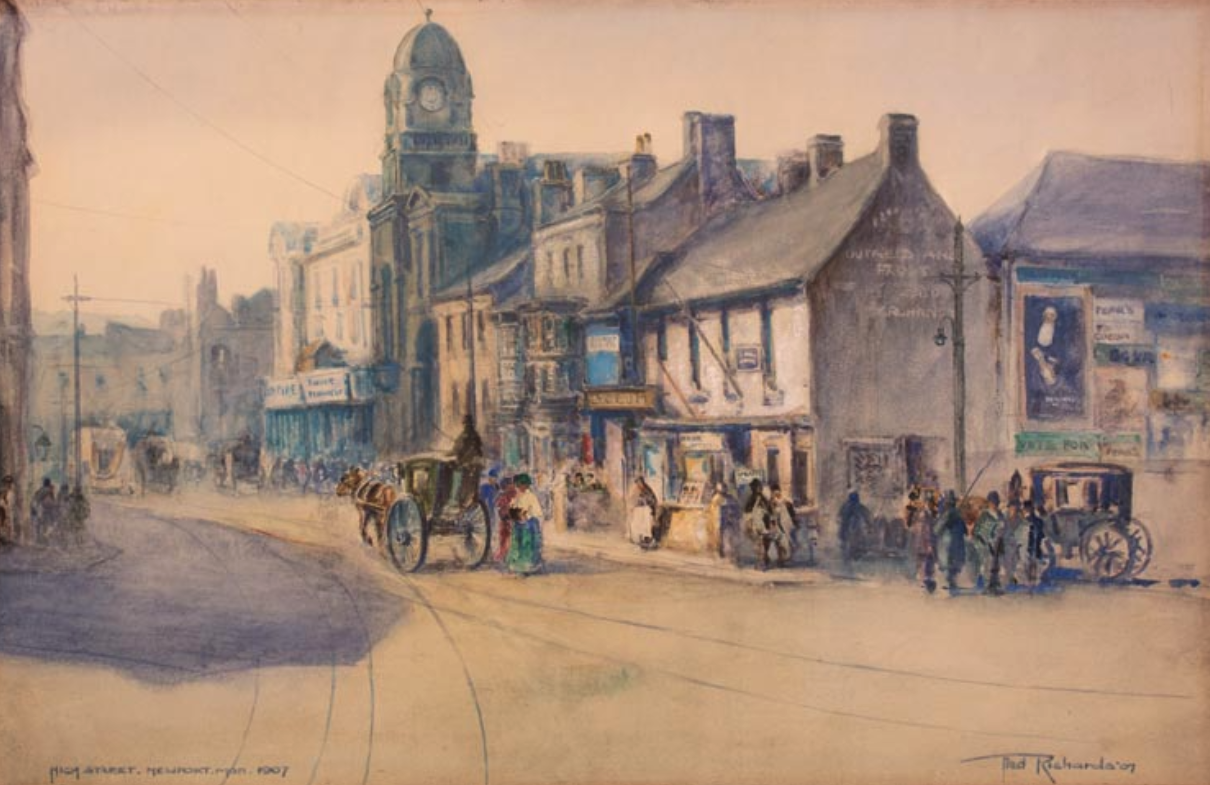

'A Subway for Mendalgief Road'
The Parliamentary and Improvement Committee of the Newport County Council held a meeting at the Town Hall, Newport, on Tuesday morning, at which the principal business was the consideration of a projected subway under the Great Western Railway on the Cardiff-road, to take the place of the present level crossing.
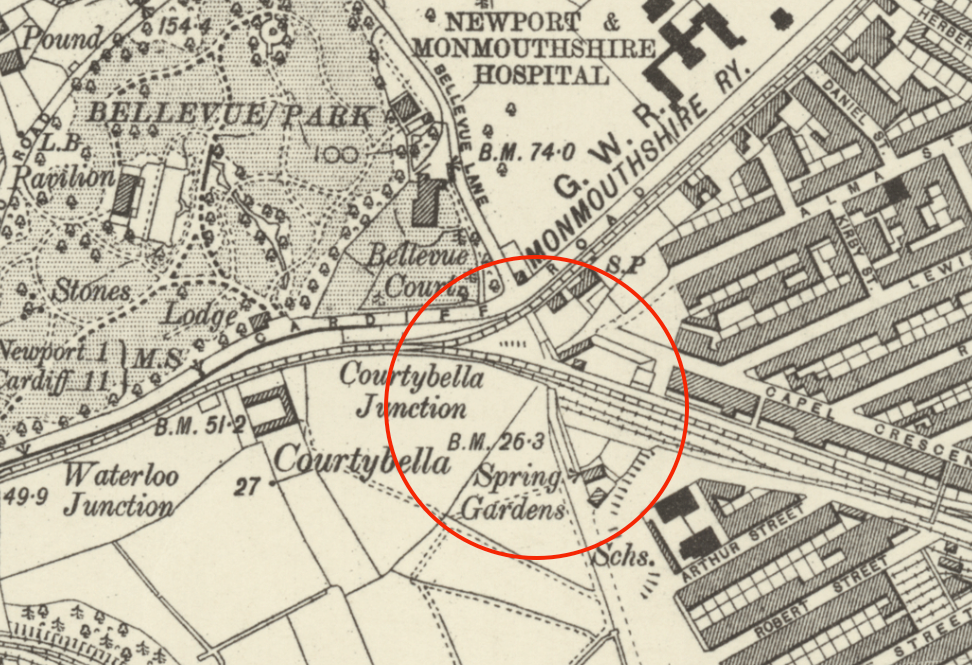
The Borough Surveyor produced plans of the proposed subway, and showed that besides affording access to Spring Gardens Board School and the converging streets in that district it would, by a curve, connect with Mendalgief-road. The scheme also provides for the completion of Mendalgief- road to a width of 50 feet. Lord Tredegar, it is understood, is willing to give the land necessary for the widening of Cardiff-road, and as the Alexandra Dock Company and the Great Western Railway Company will benefit by the subway, the scheme was approved by the committee, subject to a satisfactory agreement being arrived at between the parties concerned.
— Monmouthshire Merlin, 7th March, 1896
The subway had also been discussed in 1895.
The Parliamentary and Improvement Committee of the Newport County Council, at the meeting today, proposed an entirely new scheme for dealing with the vehicular communication between Cardiff-road and the Alexandra Docks. The scheme provided for the lowering of Cardiff-road between Clytha-square and the Park entrance, commencing at a point about 90 yards from Belle Vue-lane, so as to construct a vehicular subway underneath the railway to Mendalgief-road, and for making a new 40 feet road alongside, and at the present level of the existing road by taking a strip of land from King's Hill field and Belle Vue Court, which scheme would entirely do away with the Courtybella level crossing.
Lord Tredegar approved the proposed scheme, and would be prepared to contribute a reasonable proportion of the expense of carrying it out. It was pointed out that if this subway was constructed it would enable the land alongside Mendalgief-road to be developed without ballasting, and this would entail the construction of a deep outfall sewer down Mendalgief-road and Watchhouse-parade to the river at a considerable cost. The committee resolved —
"That with the view of submitting the scheme to the Alexandra Dock Company, the Great Western Railway, and Lord Tredegar, for the purpose of ascertaining what sums they are prepared to contribute, the borough engineer be instructed to prepare plans and estimates of the cost of the whole scheme, including the outfall sewer, and that in the meantime the preparation of plans for the proposed bridge over the Courtybella Crossing be deferred."
Mr Brown continued, that a smaller scheme adopted a few months ago had been thrown overboard, and said that for the six years he had been on the Council there had been a shilly-shallying with the interests of the South Ward in this respect which was not observable in relation to other parts of the town. Mr Collier and others contributed to the discussion, and the Borough Surveyor said it would take three or four months to prepare the plans.
— South Wales Echo, 9th July, 1895

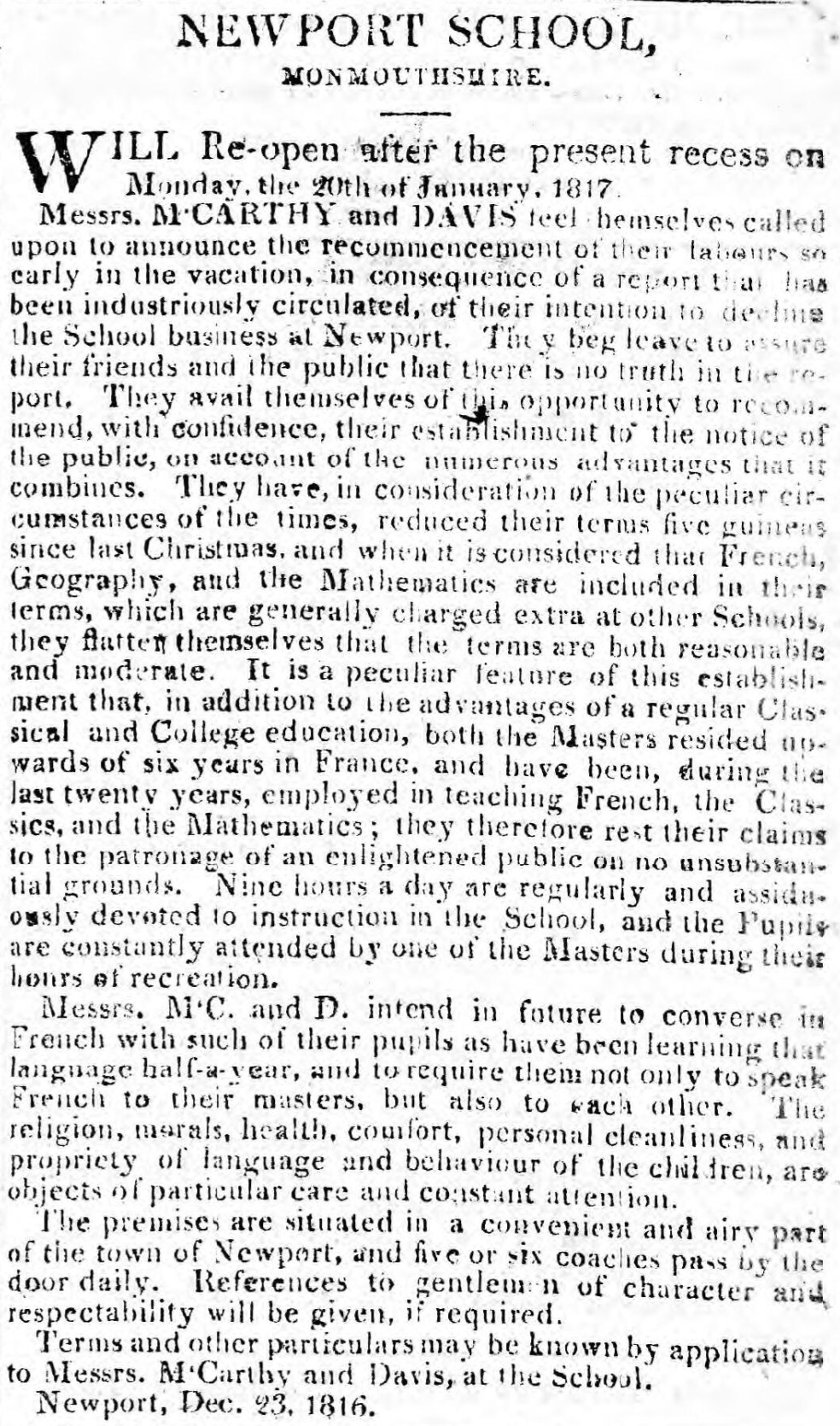

St Woolos Clock
A correspondent inquires whether it is intended to "restore'' the large public clock in St. Woollos church tower, kindly placed there by its owner, Mr Gregory, and which was of so much public utility, previously to the "restoration" of the ancient pile.
— Monmouthshire Merlin, 4th July, 1855

Livermore Brothers Court Minstrels
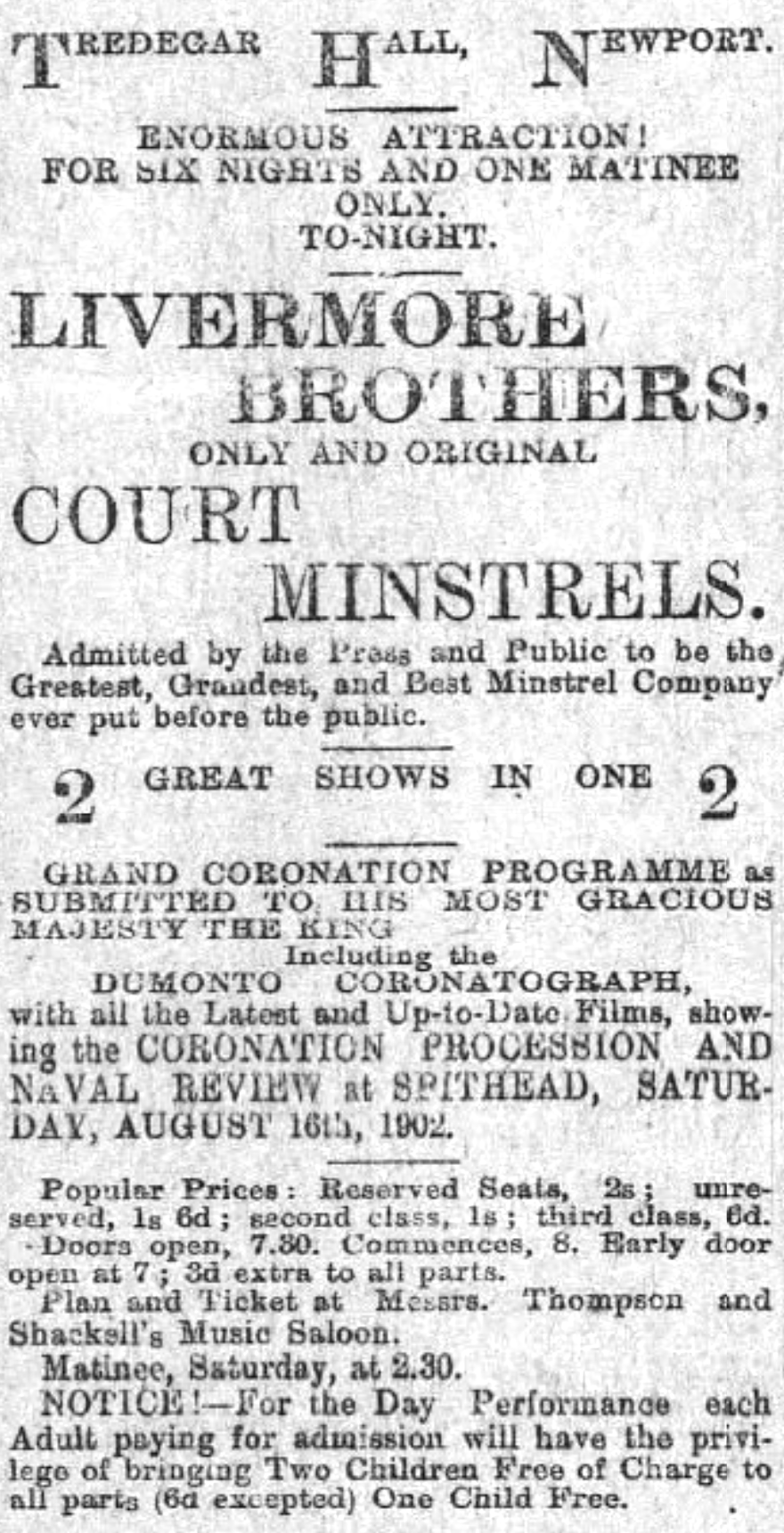
The Livermore Brothers’ Court Minstrels (active 1860s–1890s) transformed American minstrelsy into a distinctly British form of family entertainment, blending racial caricature with refined music, operatic selections, and genteel comedy. Their troupe, dressed as Georgian courtiers in powdered wigs, epitomised this “respectable” anglicized minstrelsy, contrasting with both rough music halls and elite concerts. A rare 1887 poster advertising their Bridgnorth engagement captures the spectacle of their performances, which later influenced a young James Joyce, who recalled them in Ulysses.
They played at the Tredegar Hall over 6 nights and here's a review from the South Wales Argus.
'The Court troupe are now on a visit to Newport, and the first performance was given before a fairly large and appreciative audience at the Tredegar Hall on Monday night. In addition to the company themselves, a number of new features have been introduced, making the programme diversified and interesting.
The chorus will appeal especially to the Welsh sentiment, for it consists of a remarkably well-balanced number of really excellent voices. The songs and ballads were accompanied by a good deal of patter/and jocular remarks, some of the latter containing topical allusions.
The first part consisted of comic songs and ballads. Mr. Fred Budd was well received for his humorous character rendering of the ever popular "The Honeysuckle and the Bee."
Mr. H. G. Berry, the interlocutor, was heard to great advantage in his artistic treatment of "The Sound of the Drum." Mr. Leslie Goldie gave evidence of the possession of a powerful bass voice in his song, "The Deep Cold Sea." The first part of the programme concluded with a nautical burlesque, "Livermore's Yacht," in which the troupe are represented to be at sea in a storm. The antics of the corner men were most amusing, and the introduction of sails gave the scene a realistic effect. The second part was a variety entertainment. Space prevents us from mentioning every item, but special reference should be made to the glee, " Comrades in Arms," by the minstrel choir, which was effectively given.
Carl Moneta went through a smart acrobatic performance; Clarice Mingnon, described as the banjo queen, played selections on several instruments in a way which showed her to be an accomplished musician.
"The Darkies' Jubilee" by Mesars. Buckingham and Loftus was well received, and very true to life.
Budd and Budd, society entertainers, went through a quick change business, introducing representations of the opera and drama — a clever piece of stage work which delighted the audience. Ted Loftus, the international clog dancer, and Jimmy James, the champion bones manipulator, also took part in the programme, which concluded with a burlesque "Military Tactics," in which the parts were sustained by Messrs. Loftus, Berry and Buckingham.
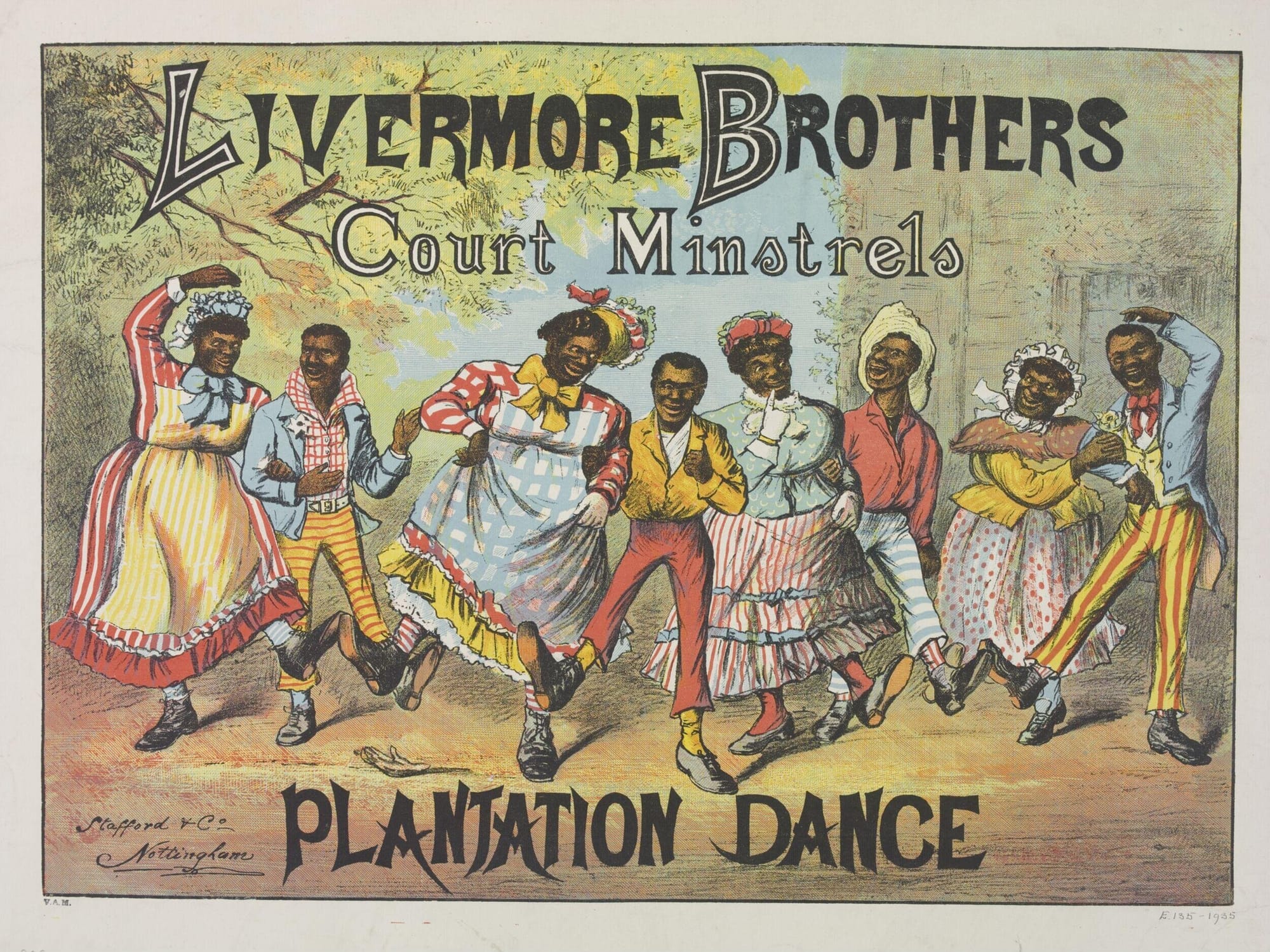

'A Night on the Mud'
The Western Valleys Railway brought down, on Monday, a large number of excursionists, who had availed themselves of the cheap trip from the Hill districts to Bristol and back, per rail and Screw steamboats. The hilarity of the party was, however, somewhat subdued by a night on the mud in the river.
— Monmouthshire Merlin, 4th July, 1855

'Cider Stores in 1855'
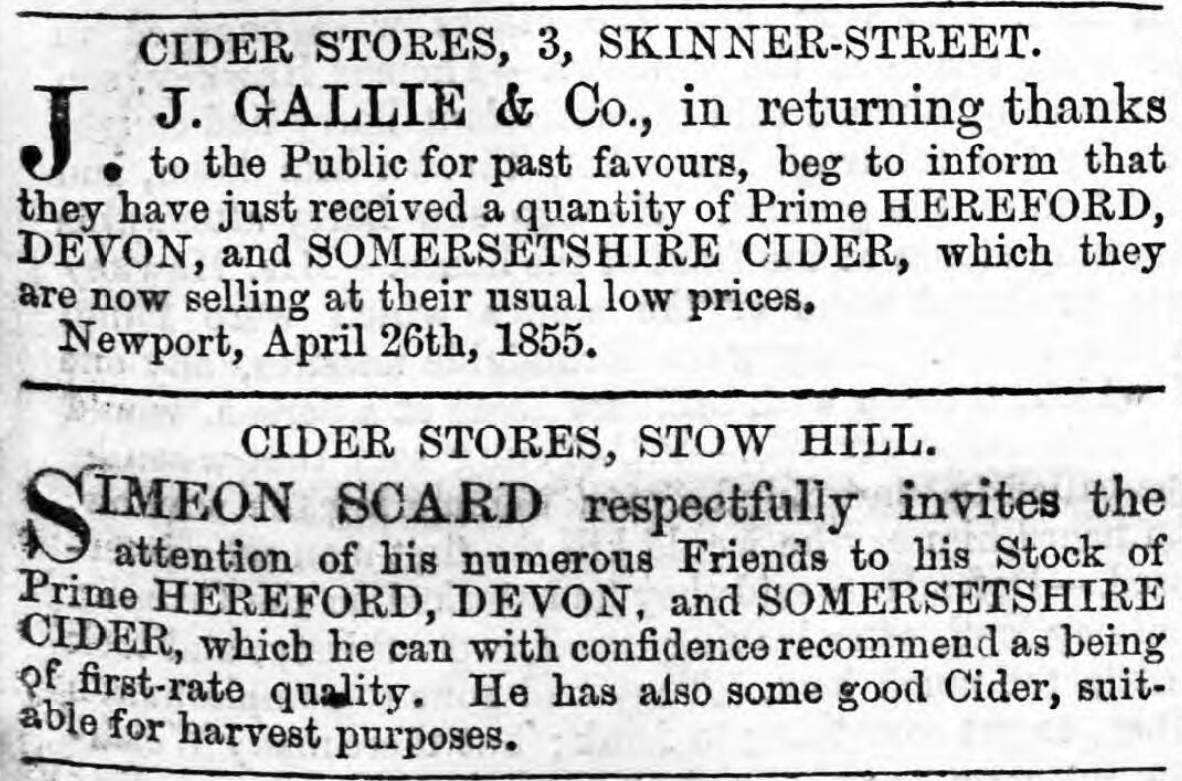
Hopefully Simeon had stopped leaving his casks on Stow Hill, something he was fined 6s 6d for in 1850.



'Stealing a Waggon'
Thomas Williams, of the Blue House, was summoned for stealing a waggon, the property of Phoebe James. Mr. Kessick said he had declined to issue a warrant, but afterwards the prosecutrix obtained a summons from him under a magistrate's order.
Upon investigation, it appeared that the accused had kept the waggon until he obtained some money due from prosecutrix's brother. The accused was discharged, the Bench remarking they had no jurisdiction, and clearly it was a question of dispute about money, which was for settlement in the County Court. At the same time, the defendant had better give up the sister's waggon, and summon the man James for the debt.
— Monmouthshire Merlin, 6th February, 1869
'Annoying Mr Wells'
Thomas Williams, a lad, fifteen years of age, of Bream-place, was charged with ringing the bell at the house of Mr. Nugent Wells, greatly to his annoyance. Complainant stated how frequently he was annoyed from day to day, and he caught this lad in the act of ringing his bell. He did not wish to press the charge severely. The boy was discharged on promising not to offend again, and requested to caution his companions not to offend in a similar way.
— Monmouthshire Merlin, 6th February, 1869
'Throwing Stones in Corn Street'
Edward Freeward, a boy, was summoned for throwing stones in Corn-street. P.C. No. 15 saw the boy throwing stones at some little girls, who had babies in their arms. The boy said they threw stones at him first. They were frequently annoying him as he was closing the shop for Mr. Edwards, draper, for whom he was errand boy.
The Bench cautioned the boy, and told him that he was liable to a very heavy penalty, but in the hope that he would not offend again, they would only fine him one shilling.
— Monmouthshire Merlin, 6th February, 1869
'Stealing a Barber's Pole'
Phillip Trigg was charged with stealing a pole from the house of Thomas Hutton, a barber. P.C. Carter proved the apprehension of prisoner with the pole in his possession, on the information of Wm. Greene. Mr. Hutton, who did not appear, had said that he did not wish to press the charge, because defendant was the support of his widowed mother. It appeared that the defendant was under the influence of drink and knew nothing about the affair. The Bench discharged him.
— Monmouthshire Merlin, 6th February, 1869
'The Cup That Does Inebriate'
Five females of ill-fame were appropriately dealt with for having indulged too freely in the "cup that does inebriate."
— Monmouthshire Merlin, 26th December, 1846

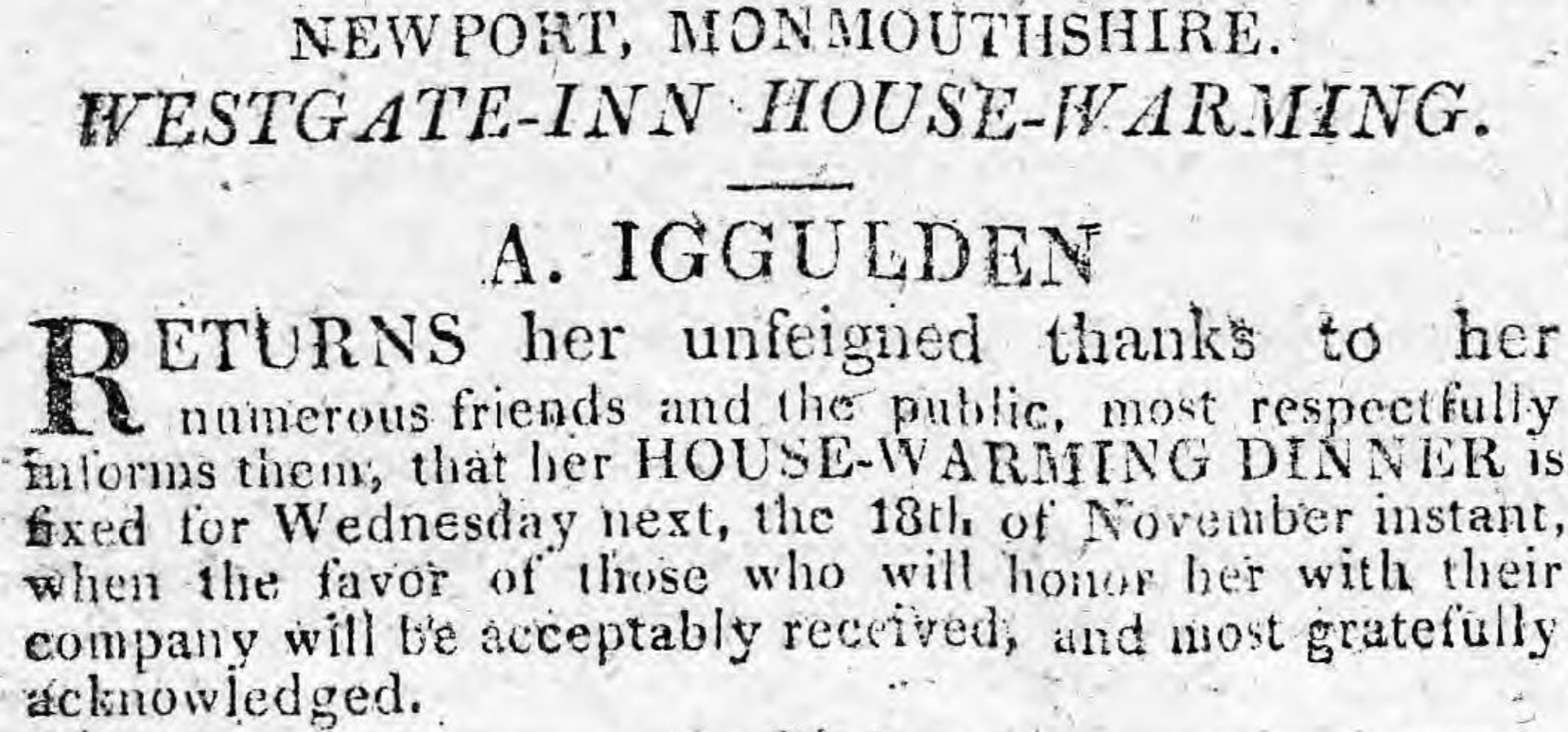

Stealing Turnip Tops
Martha Rees, Ellen Bryan alias Collins, Rhoda Rosser, Mary Ann Farrington, and Julia Kennedy, all from Newport, were charged with stealing turnip tops from a field on the Park Farm, the property of Mr. Simeon Scard.

P. S. Povall apprehended the whole of the prisoners in the field, busy cutting the tops at five o'clock in the morning, on the 17th inst.; he was on the watch, as several visits had been paid by prisoners and others to the same field, and the crop was severely damaged by them. The whole of the prisoners had been before the Bench, charged with the same kind of offence, on a previous occasion. —Committed to prison for 14 days.
— Monmouthshire Merlin, 21st April, 1871



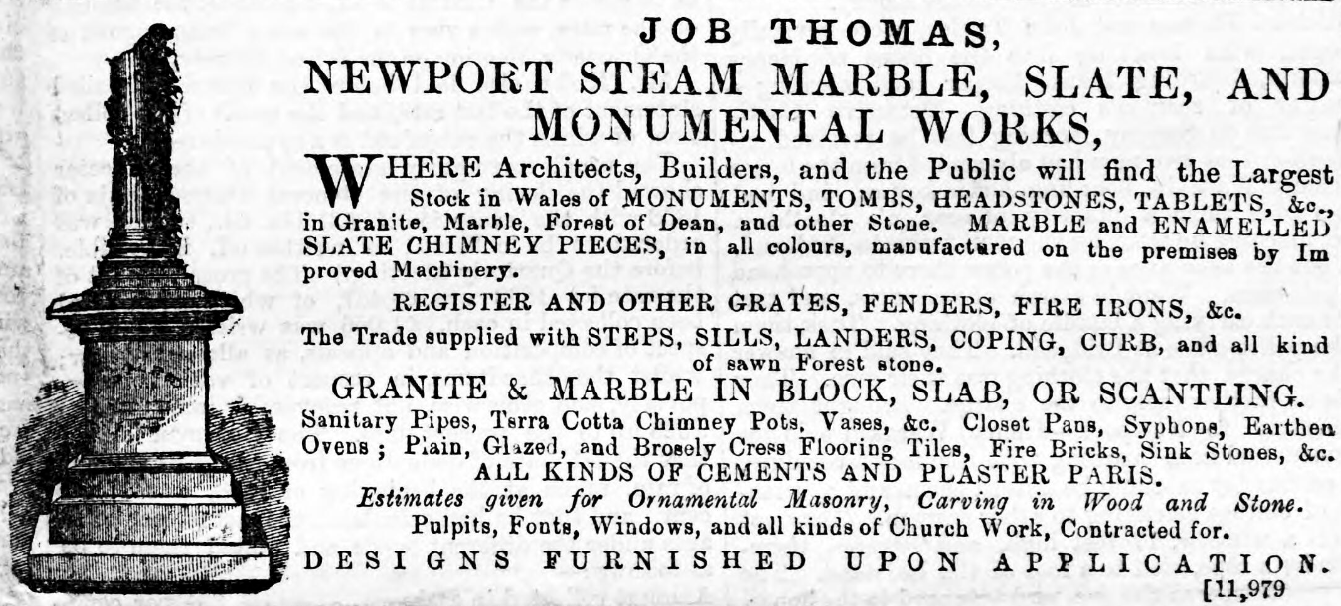


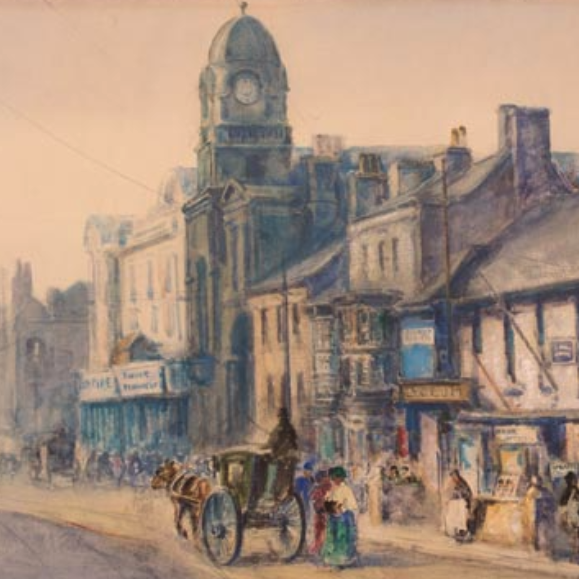
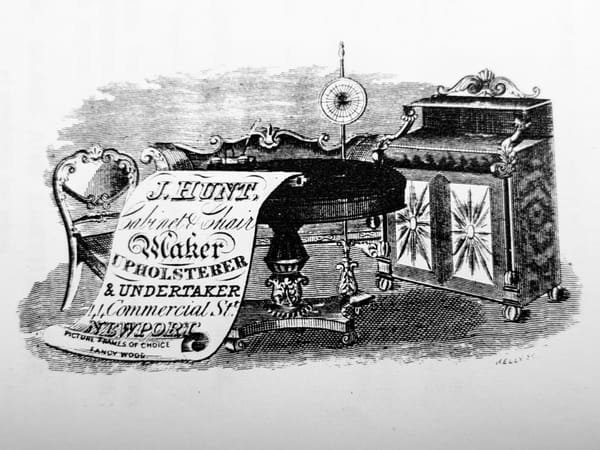
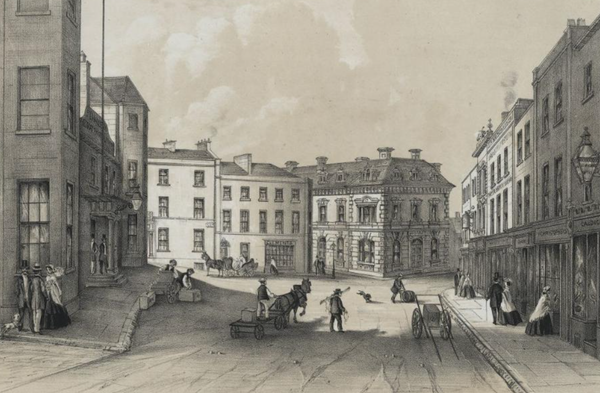
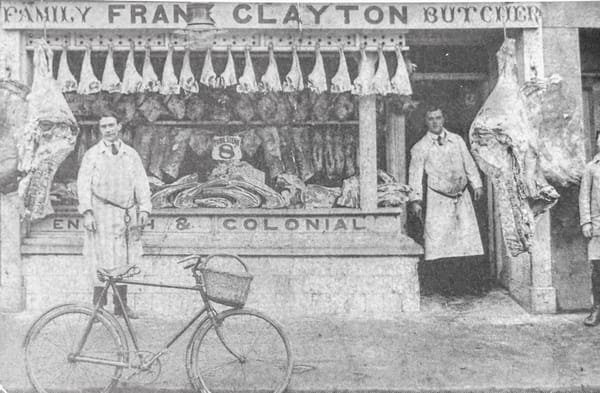
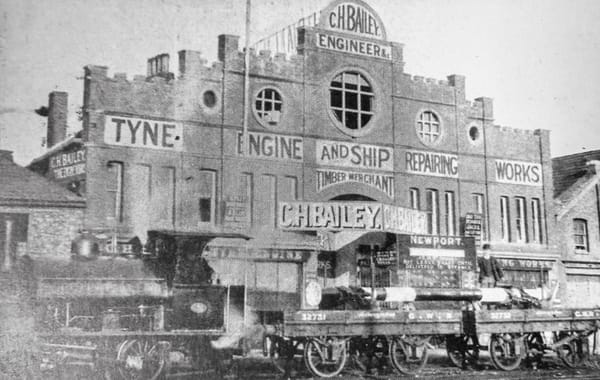

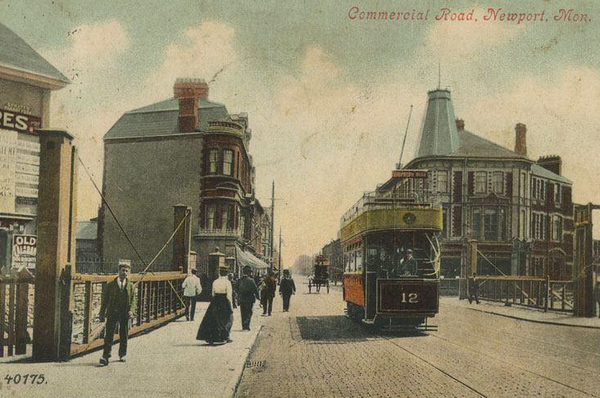
Member discussion